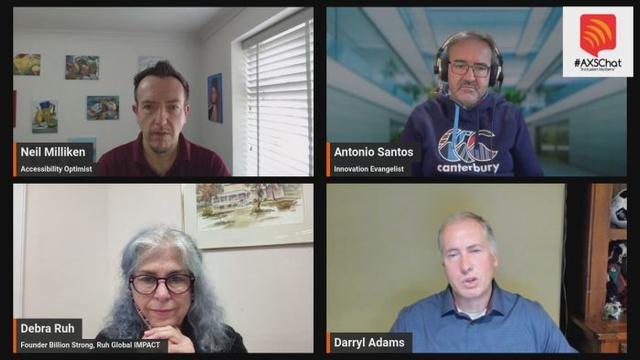Darryl Adams retired after nearly three decades at Intel, but he’s far from shaping the future of accessible technology. Adams, who recently stepped down from his role as Intel’s Director of Accessibility, joined AXSChat to reflect on his journey and share his vision for the next frontier of technology. His story offers a compelling blend of personal resilience, professional achievement, and a deep-seated belief in the transformative power of technology to make the world more inclusive.
Neil Milliken, Antonio Santos, Debra Ruh, and Darryl Adams.The Personal Journey Behind a Passion for Accessibility
When Adams began his career at Intel, accessibility wasn’t at the forefront of his work. However, a personal battle with retinitis pigmentosa, a degenerative eye condition, and single-sided deafness forced him to confront the challenges that millions face daily. His need for assistive technologies, both for himself and others, led him to a role that would shape his career and the future of technology for people with disabilities.
“I didn’t start out in accessibility, but my personal experience made it impossible to ignore,” Adams shared. As his vision worsened, so did his determination to ensure that technology would work for everyone, regardless of their abilities. His leadership at Intel was defined by this mission: to make technology more accessible, not just for himself, but for users around the globe.
Creating Cultures of Trust and Inclusion
Adams’ experience at Intel is a rare example of a company getting it right. He emphasized trust’s critical role in enabling employees to feel comfortable disclosing disabilities and requesting accommodations. This is not always an easy path. “I wasn’t honest with myself about my vision loss at first, and that made it harder for Intel to help me,” Adams admitted. It wasn’t until he self-identified that Intel’s inclusive culture—and its employees—rallied around him.
“Trust is everything,” Adams stated, noting how vital it is for organizations to create an environment where employees feel safe sharing their challenges. However, this goes beyond individual relationships. He stressed that organizations must institutionalize this culture through executive support, employee resource groups, and leadership councils focused on diversity and inclusion. These structures, he said, create the conditions for long-term, systemic change.
The Promise and Perils of AI for Accessibility
As someone who spent nearly 30 years at the cutting edge of technological innovation, Adams is uniquely positioned to comment on the explosion of artificial intelligence and machine learning. While AI promises to revolutionize accessibility—particularly through tools like conversational AI and real-time customization—it also presents ethical challenges. Adams is optimistic but cautious.
He envisions a future where AI-powered technologies personalize user experiences based on their specific needs. “If we can help technology understand us better, we can make it work for us in ways we’ve never imagined,” he said. For those with speech or hearing impairments, for instance, AI could radically improve communication, breaking down barriers that have existed for decades.
But with these advancements come ethical responsibilities. AI, as Adams pointed out, can be biased if the data used to train models isn’t inclusive. “We need to ensure that AI systems reflect the diversity of society and don’t leave anyone behind,” he warned. He argued that this is a systemic issue requiring companies to be proactive in creating responsible AI processes from the start.
A New Chapter in Accessible Technology
Though retired from Intel, Adams has no intention of stepping away from the world of technology. In fact, his next move is set to have a significant impact. He has taken on the role of chair for the Consumer Technology Association’s (CTA) new working group focused on age tech and accessibility. Adams is clear that accessibility isn’t just a matter of disability; it’s a challenge that the world’s ageing population will increasingly face.
“With the global population of over-65s set to outnumber those under 15 for the first time in 2024, age tech will become an urgent focus,” Adams noted. He believes this is an opportunity for technology to truly serve society, ensuring that as we age, we can all continue to interact with the digital world in meaningful ways.
Adams’ new role is particularly timely as CES, the world’s largest Consumer Electronics Show, approaches. His aim is to spotlight accessibility and age tech on one of the biggest stages in the tech industry, ensuring that these critical issues are no longer sidelined but instead become central to how we think about the future of innovation.
A Legacy of Change, A Future of Hope
Reflecting on his 28-year tenure at Intel, Adams expressed pride in how far the industry has come—but he remains focused on the road ahead. He believes that we’re only beginning to tap into the potential of technology to improve lives, particularly for people with disabilities and the elderly. “This is the time for us to make a real difference,” he said. “The technology exists; now we need to make sure it’s being used in the right way.”
As he embarks on the next chapter of his career, Adams’ work continues to be driven by the same principles that guided him throughout his time at Intel: inclusivity, trust, and a commitment to creating technology that works for everyone. And as the world grapples with the ethical and practical challenges of the AI revolution, figures like Adams will be essential in ensuring that the future of technology is one that empowers all.
Adams’ parting message is clear: Technology should be groundbreaking and bridge the gap between different abilities, making the world a better place for all.
Also, available on podcast and video formats.
Shaping an Inclusive Future in Tech – AXSChat Podcast
Darryl Adams, a luminary in the field of accessibility, joins us to share the extraordinary path that defined his 28-year career at Intel, shaped profoundly by his personal experiences with retinitis pigmentosa and single-sided deafness. Darryl's story is a heartfelt exploration of how Intel's inclusive culture, coupled with his relentless passion, empowered him to champion accessible technology for all. Through his reflections, we learn not just about the technological strides made at Intel, but also about the wider impact of fostering diversity and inclusion within the workplace.Darryl takes us on a journey into the future of technology and communication, unveiling the world of possibilities opened by machine learning and conversational AI. Imagine a world where interactions transcend traditional interfaces, transforming into seamless, conversational exchanges that nurture human connection. Darryl shines a light on the transformative potential of these technologies to enhance communication tools, especially for those with speech differences or hearing loss, promising a more inclusive and interconnected world.As we navigate the ethical dimensions of technology, we are urged to consider the responsibility of major tech companies in shaping AI that prioritizes inclusivity and fairness. By weaving together cybersecurity, accessibility, and ethics, the conversation addresses the need for personalized algorithms that cater to individual needs, ensuring trust and enhancing user experiences. Darryl's insights underscore the importance of refocusing tech industry objectives from profit to user-centric optimization. Finally, we reflect on the shifting demographics of an aging population and the vital role this plays in the ongoing dialogue around accessibility, urging collective efforts to embrace and address these emerging challenges.Support the showFollow axschat on social mediaTwitter:https://twitter.com/axschathttps://twitter.com/AkwyZhttps://twitter.com/neilmillikenhttps://twitter.com/debraruhLinkedInhttps://www.linkedin.com/in/antoniovieirasantos/ https://www.linkedin.com/company/axschat/Vimeohttps://vimeo.com/akwyz- Shaping an Inclusive Future in Tech32:03Empathy and Innovation in Online Retail32:45Equity in Tech: Making Applications Accessible30:26Driving Progress in European Web Accessibility32:26From Design to Code: Achieving True Inclusion32:59
https://vimeo.com/1016069835?share=copy#t=0
#accessibility #ageTech #ai #ConsumerTechnologyAssociation #DarrylAdams #digitalInclusion #diversity #InclusiveTechnology #Intel #selfIdentification #visionLoss

